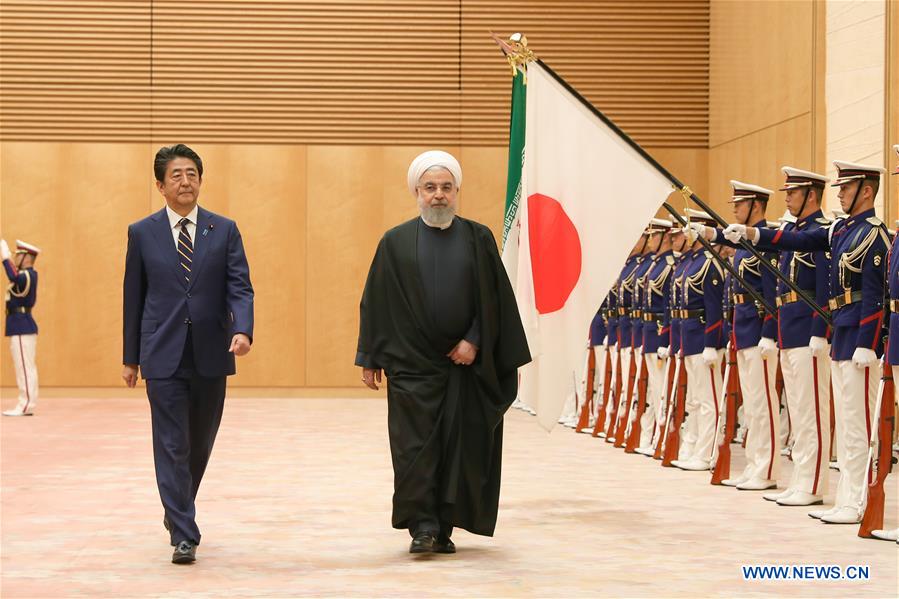
Japanese Prime Minister Shinzo Abe (L) and visiting Iranian President Hassan Rouhani inspect the guard of honor in Tokyo, Japan, Dec. 20, 2019. Rouhani, on a two-day trip to Japan marking the first for an Iranian president since 2000, heard from Abe about his concerns about rising tension in the Middle East at the outset of the meeting. (Xinhua/Du Xiaoyi)
TOKYO, Dec. 20 (Xinhua) -- Japanese Prime Minister Shinzo Abe on Friday held talks with Iranian President Hassan Rouhani in Tokyo amid ongoing tensions in the Middle East.
Rouhani, on a two-day trip to Japan marking the first for an Iranian president since 2000, heard from Abe about his concerns about rising tension in the Middle East at the outset of the meeting.
Rouhani, for his part, maintained that peace and stability in the Middle East and the Gulf region are vital for Iran.
The Iranian president also said that a nuclear agreement inked between Iran and other world powers remained extremely important and condemned the United States' withdrawal from the pact and its increased sanctions on Iran.
He called the moves by Washington both unilateral and irrational.
Abe, who visited Iran in June to try and help mediate talks between Tehran and Washington, said that Tokyo hoped to do whatever it could to help ease tensions.
The Japanese leader also urged Iran to stick to the nuclear deal and constructively contribute to peace and stability in the region, while Rouhani said he hoped Japan and other countries would help contribute to efforts to keep the pact alive.
Tensions have risen in the Middle East following the United States pulling out of a 2015 international nuclear accord and slapping fresh sanctions on Iran.
Following U.S. President Donald Trump pulling his country out of the nuclear accord inked between Iran and six major powers and restoring sanctions on Iran, Tehran said it planned to keep more enriched uranium than is permitted under the pact.
During the talks Friday, Abe is also believed to have explained to Rouhani Japan's plan to deploy its Self-Defense Forces (SDF) to the Middle East.
The planned deployment is to purportedly conduct information-gathering operations and others related to enhancing the safety of commercial shipping in the region.
The plan proposes that a helicopter-carrying destroyer and a P-3C patrol plane be sent to the region along with around 250 troops, who may be based in or around the Gulf of Oman, or the Bab el-Mandeb Strait.
Japan has decided to conduct its information-gathering and security operations independent of a U.S.-led coalition to ensure maritime security in the Strait of Hormuz, saying that the SDF will stay away from the strait near Iran in a bid to maintain its friendly ties with Tehran.
Tehran previously told Tokyo that it does not believe the presence of any foreign forces in the region would help boost stability, security or peace.
It has maintained that U.S. policies are the root cause of escalating tensions in the Middle East and been critical of the United States for imposing "maximum pressure" on Tehran and for withdrawing from the 2015 nuclear agreement.
The strait is a key gateway for oil from the Middle East to reach resource-poor Japan.
?